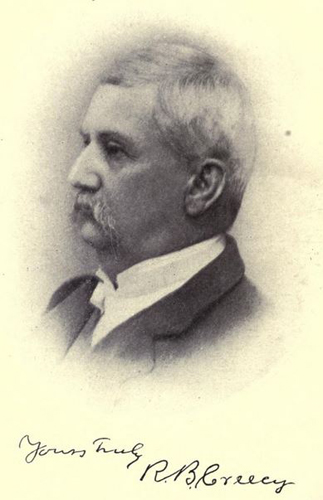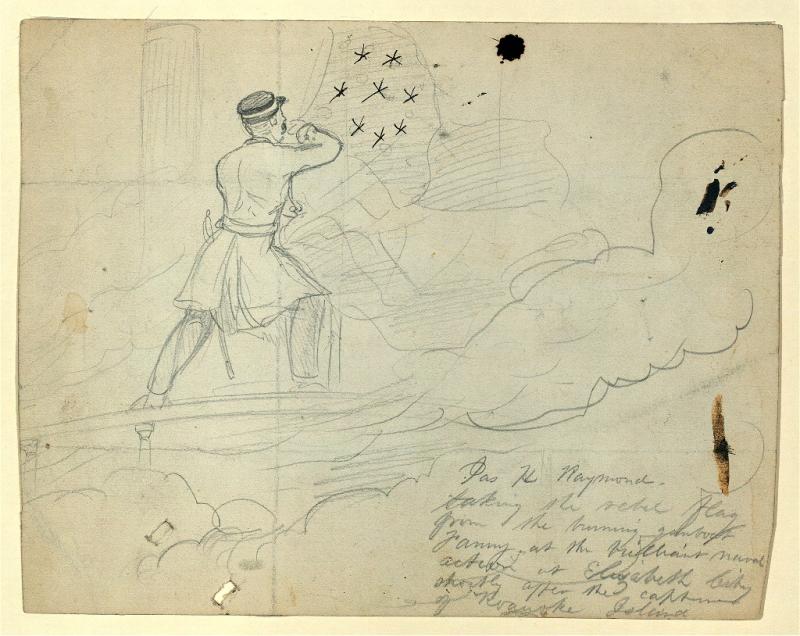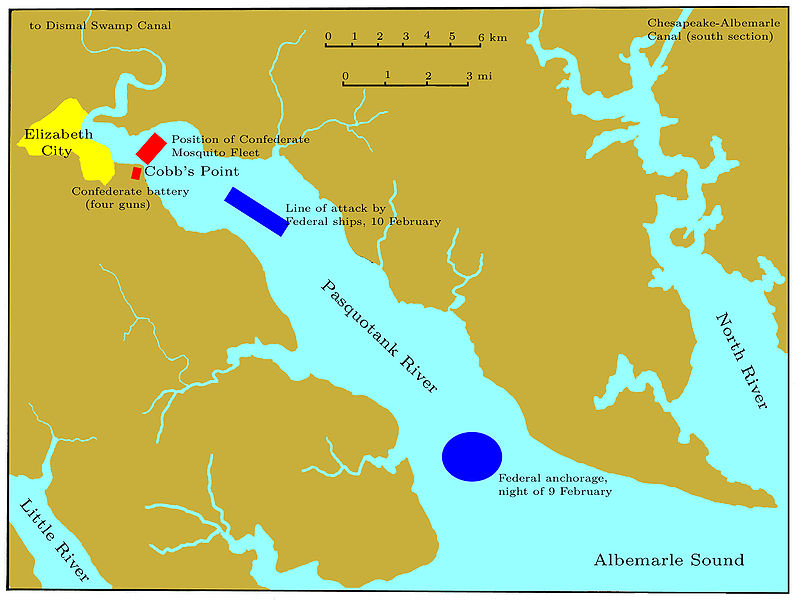Richard Creecy was a lawyer and founder of a weekly newspaper, The Economist, who published the book Grandfather's Tales of North Carolina History to preserve history as he had experienced it.
In the excerpt below, Creecy discusses the burning of Elizabeth City during the Burnside Expedition. The Burnside Expedition was an element of the Union's larger "Anaconda Plan" to blockade and weaken the Confederacy. Although the Union did capture Cobb's Point just outside of Elizabeth City, it was not Union troops that set fire to the city; the Confederate troops were ordered by Brigadier General Henry A. Wise to set the city ablaze as they retreated.
Perhaps the most memorable day in the annals of Elizabeth City was the day of the bombardment, early in February, 1862, after the fall of Roanoke Island. After the fight and Confederate defeat at Hatteras, the year before, the sound and river towns of the Albemarle section were in a condition of perpetual trepidation in fear of the invasion of the Federal troops who had taken possession of Hatteras, and the apprehension of injury was conjured into a thousand fancies of outrage and destruction of life and property. But Burnside, who was in command at Hatteras, was in no hurry to push his advantage, and the next step for him was to capture Roanoke Island, which was occupied by various troops, under the command of Col. Henry M. Shaw.
Roanoke Island was attacked and captured early in February, and the people of Elizabeth City were first to hear the sad news. There seemed to be a sort of mental telegraphy between Roanoke Island and that town, and the news of Roanoke and its fall was soon followed by the news that the Federal gunboats were preparing for a hostile visit to the water towns in North Carolina. We, as nearest to the stragetic point, were in a state of tremulous buzziness. On the streets the enquiry every day from man to man was, "Are they coming? When are they coming? Will they shell the town? Shall we fight, or what shall we do?" Some said fight. Col. S. D. Starke, highest in command, ordered out the militia and threw up breastworks at Cobb's Point for the defence of our harbor. Many thought it best to set fire to our houses and retreat by the light, as the Russians had successfully done at Moscow when invaded by NapoleonIn 1812, Napoleon invaded Russia. Napoleon's army pushed back Russian troops from their border all the way to the capital city of Moscow. As the Russians retreated, they burned anything that might be used to sustain the invading army, such as fields and gardens, fence posts (which were used by the army as firewood), and grass (which was used to feed horses.) When Napoleon reached Moscow, he found a deserted city, stripped of any of its resources. Thus, although Napoleon was technically victorious, his army was stranded in Russia with no food for the men or horses. The French army was weak — the men and horses starving — which made it easy for the Russian army to surround Napoleon and force his men to retreat the same way they had come into Russia — over the burnt, desolate countryside. As many as a hundred thousand of Napoleon's men starved or froze to death on their trek out of Russia.. Colonel Starke approved it. Others did it when the time came.
We were living on Pasquotank River in the country, nine miles from town, but were in town every day to keep up with current events. Returning from town one day, we heard when in town that the Yankees were getting their gunboats ready to come to town. The rumor had greatly excited the town, and the people were much disturbed what to do when they came. We got home late, communicated the startling news to our disturbed household, and retired. About midnight a messenger from Elizabeth City roused us from sleep and delivered a message from Rev. E. M. Forbes, Rector of Christ Church, saying that a statement had reached town that the Yankee gunboats were preparing to leave Roanoke Island for Elizabeth City, and requesting that we would send up wagons to remove his books and valuables to our home in the country for safety. We hurried Isaac off immediately with a farm wagon, a three-mule-cart with driver, and little Peter with a single box wagon. We rose early next morning, in fact we didn't go to sleep any more that night. While at breakfast, a servant ran into the room from upstairs, saying with great alarm that the river was full of steamboats going up towards town, like a wedge, that there was more'n forty of 'em. We ran upstairs, looked out of an upper window, and there they were, moving like a phalanx, to disturb our peace and happiness....
Finishing our hasty breakfast, we mounted our horse and set out for town, and our eyes opened on a sight we hope never to see again. All the people of the town were on the road, most of them were afoot, shoe-tops deep in mud and slush, muddy, bedraggled, unhappy, wretched. They were looking for an asylum of safety among country friends. We met scores of our town friends, forlorn and miserable. We asked for others, and they told us the town was on fire and was deserted, and that a naval engagement was raging in the harbor; that two Confederates were killed and three Yankees. We soon met General Heningsen on the road, flying before an unseen enemy, from the fort at Cobb's Point, and "minding not the order of his going." We met some ladies afoot, unhappy, looking for an asylum. We met the Piemonts in "Little Billy's" three-mule cart, looking for our house. They told us of the distress. That it was a dead town. That it was dead as a graveyard, that all had left, some never to return. We asked after our friends. They said that some had set fire to their houses and made tracks for Currituck, that others had done the same, and that the whole town was then on fire, to spite the Yankees; that the Elliots had started on foot for Oxford, that the Martins were in a buggy, flying for Oxford, that Rev. E. M. Forbes was staying in town to meet the Yankees when they landed on the wharf, surrender them the town and ask protection; that Mr. Forbes, when they left, was putting on his ecclesiastical vestments, in order that they might respect his sacred office.
It was a grand, gloomy and peculiar time, such as this town had never seen before, has never seen since, and we trust may never see again.
Source Citation:
Creecy, Richard Benbury. Grandfather's Tales of North Carolina History. Raleigh: Edwards & Broughton, 1901. https://archive.org/details/grandfatherstale00cree/page/n7


